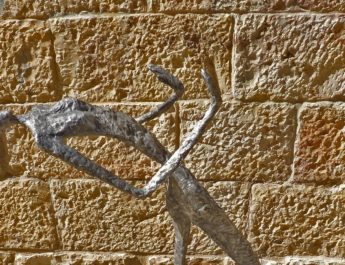Psalm 16:8-11
Easter Monday – A Women’s Lectionary
8 I keepA the LordB alwaysC beforeD me;
A “keep” = shavah. This is to equalize, resemble, agree with, compare, adjust, compose, place, or yield.
B “Lord” = YHVH. From havah (to be, become) or hayah (to come to pass, become, be). This is the name of the God of Israel, the self-existent and eternal one, the tetragrammaton. This pronunciation has been lost to time so “Lord” is generally used in its place.
C “always” = tamid. May come from a word that means to stretch. This word means an indefinite period of time. So, it could be regular or daily. It could also be constantly, continually, always, or perpetually.
D “before” = neged. From nagad (to declare, make conspicuous, stand in front, manifest, predict, explain). This is in front of, opposite to. It can refer to a counterpart or partner, one corresponding to or in the sight of.
because he is at my right hand,E I shall notF be moved.G
E “right hand” = yamin. May be from yamam (to go or choose the right, use the right hand; to be physically fit or firm). This can mean right hand, right side, or south. Since most people are right-handed, the metaphorical usage of this word presumes that the right hand is stronger and more agile. Thus, it is the instrument of power and action.
F “not” = bal. From balah (to grow old, wear out, consume, waste, enjoy, fail, decay). This is not, lest, neither. Properly, it refers to a failure, so it implies nothing or not at all.
G “be moved” = mot. This is to shake, slip, falter, stagger, move, fall, give way, waver, be carried.
9 ThereforeH my heartI is glad,J and my soulK rejoices;L
H “therefore” = ken. Perhaps from kun (properly, in a perpendicular position; literally, to establish, fix, fasten, prepare; figuratively, it is certainty, to be firm, faithfulness, render sure or prosperous). This is to set upright. Generally used figuratively to mean thus, so, afterwards, rightly so.
I “heart” = leb. May be related to labab (to encourage; properly, to be encased as with fat; used in a good sense, this means to transport someone with love; used in a bad sense, it can mean to dull one’s senses). This is the heart, courage, one’s inner self, the mind, or the will. Heart is only used in a figurative sense in the Old and New Testaments.
J “is glad” = samach. This is to rejoice or be glad. Properly, it is to brighten up in a literal or figurative sense.
K “soul” = kabod. From kabad (to be heavy, weighty, burdensome). This is weighty. Figuratively, glorious, abundant, riches, honor, splendor – a reference to one’s reputation or character. This word is often used to describe God and God’s presence.
L “rejoices” = gil. Properly, this is twirling around because of a strong feeling whether of rejoicing or from fear. This can be rejoice, be glad or joyful, or to cry.
M “body” = basar. From basar (being a messenger, publish, carry preach; properly, this is being fresh, rosy or cheerful as one bearing news). This is flesh, the body, fat, skin, self, nakedness, humankind, or kin. It can also refer to private parts.
N “rests” = shakan. This is to settle down in the sense of residing somewhere or staying there permanently. It can mean abide or continue. “Mishkan,” taken from this verb, is the Hebrew word for the Tabernacle (as a place where God abided).
O “secure” = betach. From batach (to hide for refuge, be secure or sure; figuratively, it refers to trust, being confident, or hoping). This is a place of refuge. So, abstractly, it can be confidence, security, hope, trust, or assurance.
10 For you do not give meP upQ to Sheol,R
P “me” = nephesh. Literally, “my soul.” Related to naphash (to refresh or be refreshed). This is soul, self, person, emotion. It is a breathing creature. Can also refer to appetites and desires.
Q “give…up” = azab. To loosen, relinquish, permit, forsake, fail, leave destitute.
R “Sheol” = Sheol. Perhaps from sha’al (to ask, request). This is the place where the dead go, the grace, the underworld.
or letS your faithful oneT seeU the Pit.V
S “let” = natan. This is to give, put, set, offer. It is to give literally or figuratively.
T “faithful one” = chasid. From chasad (being good, kind, merciful; may mean bowing one’s neck as is done in the presence of an equal for courtesy’s sake; so, if one in a superior position is treating you like an equal, that is what is captured here). This is faithful, kind, pious, merciful, or gracious. It can also refer to godly or pious people. This is where Chasidic Jews take their name from.
U “see” = raah. This is to see in a literal or figurative sense so stare, advise, think, view.
V “Pit” = shachath. From shuach (to bow or sink down in a literal or figurative sense, humble). This is ditch, trap, grave, or hole. Figuratively, it could be destruction or corruption.
11 You showW me the pathX of life.Y
W “show” = yada. This is to know, acknowledge, advise, answer, be aware, be acquainted with. Properly, this is to figure something out by seeing. It includes ideas of observation, recognition, and care about something. It can be used causatively for instruction, designation, and punishment.
X “path” = orach. From arach (to go, travel, wander). This is a road that is widely used, highway, caravan, traveler, troop.
Y “life” = chay. From chayah (to live or keep alive literally or figuratively). This is alive, living, lifetime. It can also be used to describe someone’s age. It can refer to animals, plants, water, or a company or congregation of people. It is life in a very broad sense.
In your presenceZ there is fullnessAA of joy;BB
in your right hand are pleasuresCC forevermore.DD
Z “presence” = paneh. From panah (to turn, face, appear). This is face in a literal or figurative sense. It could be face, presence, anger, respect. It can also be used of God to indicate divine favor or presence.
AA “fullness” = soba. 8x in OT. From saba (to be satisfied or full in a literal or figurative sense; to have plenty of). This is abundance, fullness, satisfaction. Properly, it is being sated – having enough food. Figuratively, it is fullness of joy.
BB “joy” = simchah. Related to “is glad” in v9. From samach (see note J above). This is joy, rejoicing, pleasure, or glee.
CC “pleasures” = na’iym. 13x in OT. From na’em (to be pleasant or lovely; to surpass in beauty; to be delightful in a literal or figurative sense). This is sweet, lovely, or delightful.
DD “forevermore” = netsach. From natsach (something that glitters from a distance or stands out, excels, has status/standing; also to be permanent or enduring). This is properly a goal or destination as the bright focus to which one journeys. It can be splendor, truthfulness, or confidence. Most often, it refers to everlastingness, always, continually.
Image credit: “Azaleas at Valley Gardens” by Anguskirk, 2005.




